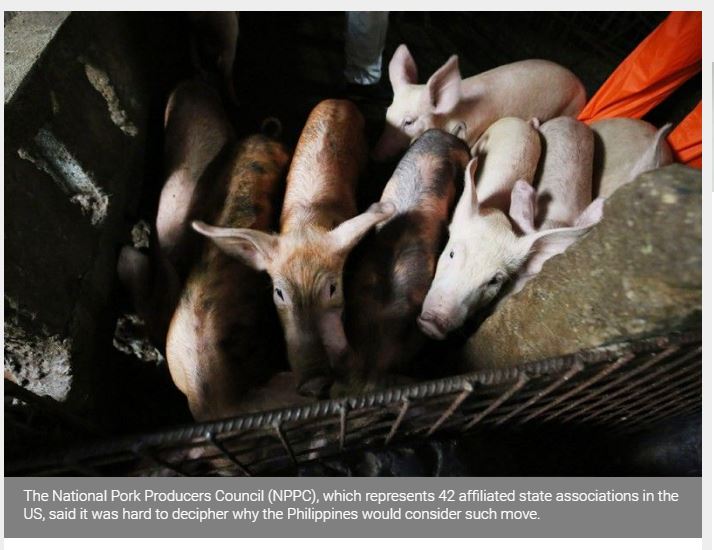Philippines urged to reconsider blanket ban on pork imports
WASHINGTON — The Philippines should think twice about imposing a blanket ban on all pork imports after being hit by African swine fever.
The National Pork Producers Council (NPPC), which represents 42 affiliated state associations in the US, said it was hard to decipher why the Philippines would consider such move.
“If it is not science-based, it is very hard to understand why a government would move forward with a ban on products that don’t have ASF. Something that is just based on gut feeling is bad,” NPPC director for International Affairs Maria Zieba said in a meeting here.
“We want it to be rules-based and we want others to treat us fairly and we treat others fairly, especially on the pork side. I think we have a very good trajectory of being good partners and we don’t want to jeopardize that in any way,” she said.
The Samahang Industriya ng Agrikultura (Sinag) is urging Agriculture Secretary William Dar to suspend the issuance of sanitary and phytosanitary (SPS) permits for pork imports.
Dar has yet to address the call of the umbrella group of various subsectors in the agriculture sector.
“Countries have been allowed to protect their respective local agriculture in times of outbreak. Under WTO (World Trade Organization)rules, there is always that assumption of regularity in any policy of the national government,” Sinag chairman Rosendo So said.
“These tainted pork imports are the source of ASF,” he said.
The Philippines has imposed a ban from imports coming from China, Mongolia, Vietnam, Cambodia, Hong Kong, North Korea, Laos, Russia, Ukraine, Czech Republic, Moldova, South Africa, Zambia, Hungary, Bulgaria, Belgium, Latvia, Poland, Germany and Romania.
“If you ban all imports, where are you going to get it?” Zieba argued.
Local stakeholders claim they can supply all the requirements of the Philippines for pork but this may not be entirely true as the country continues to import every year.
From January to July this year, the US exported 21,767 metric tons (MT) of pork to the Philippines, down 19 percent from the same period last year.
The value of US pork exports to the Philippines declined by 23 percent to $50 million in the first seven months.
Last year, total US pork exports stood at $64.7 billion.
“The Philippines is really an important market for us. We have been developing it for the last decades. Asia is quite important for us as a market as a whole. China is our biggest market,” Zieba said.
„Unfortunately, our exports to China and Hong Kong are suffering because we are in the middle of a trade dispute,“ she said.
For this year, US exports to the Philippines will likely remain at the same level.
“It would be very similar to last year. It could trend up a bit for the holiday season,” Zieba said.
The US maintained it is ready to supply the Philippines its pork requirements amid a potential shortfall due to the ASF.
„ Our production is growing two percent annually. There is plenty of room and being out of the Chinese market, it creates a lot of opportunities for us to export to somebody else’s market,“ Zieba said.
Pork industry in the US contributes $40 billion to its economy. Last year, it slaughtered 124 million pigs, producing 11.79 billion kilograms of pork.
About 40 percent of its exports goes to Canada and Mexico while the big recipients of products in Asia are Japan, Korea, China and Hong Kong.
Meanwhile, San Miguel Foods Inc., a unit of diversified conglomerate San Miguel Corp., assured the the public that its products are safe to eat and are not affected by ASF.
SMFI said it follows the strictest animal health and biosecurity protocols and that its chilled, frozen, and processed pork are produced from company-controlled hog breeding, growing, slaughtering, and manufacturing facilities.
All hogs are fed with sanitized feeds from its B-MEG plants using raw materials that are checked for contaminants that may affect food safety, SMFI noted.
„Our hog growing farms are kept separate from our breeding animals in order to minimize cross contamination and break potential disease cycles. Our animal health programs are preventive in nature and are centered around biosecurity, disinfection and vaccination,“ the company said.
„Regular surveillance for diseases through laboratory testing of blood and tissue samples are done to detect any incidence of disease and develop prevention and control measures before each instance develops into an outbreak situation,“ it said.
SMC have not detected positive reactors in any of its farms nationwide after it tested for ASF using polymerase chain reaction.
It added that its slaughter plants are constantly monitored by the National Meat Inspection Service and each hog is inspected before slaughter while each carcass is certified as disease-free before delivery to various meat shops and distributors.
ASF is seen to significantly affect the P260-billion hog industry. Including related industries, the sector is worth P416 billion.
Source: https://www.philstar.com/business/2019/09/19/1952947/philippines-urged-reconsider-blanket-ban-pork-imports#qXbc8fhq7OuGLMrE.99


 English
English




